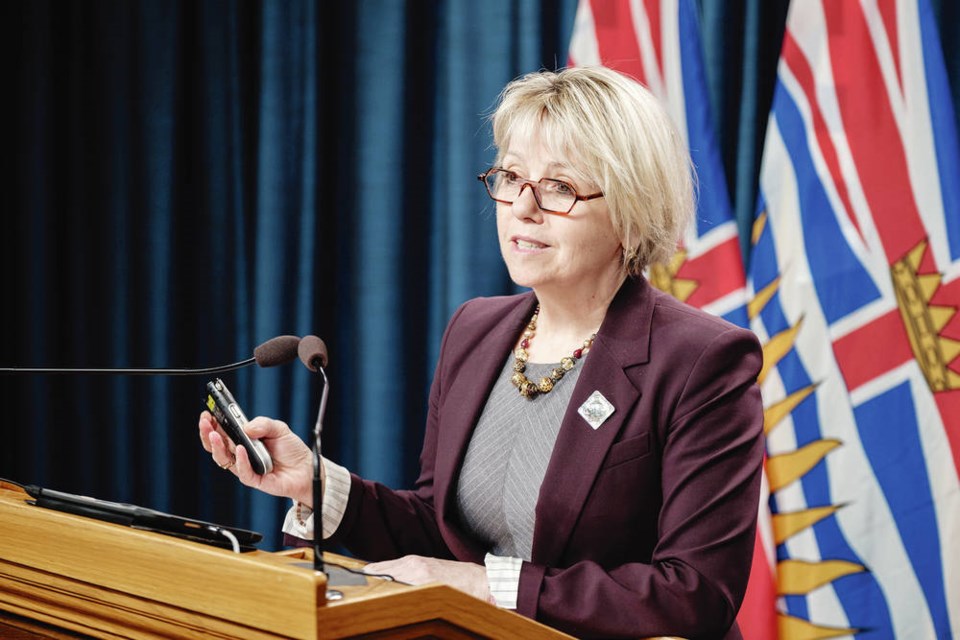B.C. continues to see record-high COVID-19 case counts, with 1,130 new cases reported over two days — including another 16 in the Island Health region.
That put the province over the 20,000-case threshold, with daily new case counts doubling every 13 days, provincial health officer Dr. Bonnie Henry said Thursday, as she presented the latest computer modelling of infection growth.
“We are in a challenging time, perhaps the most challenging time of this pandemic,” Henry said.
The rapid increase in cases since the Thanksgiving weekend, particularly in the Lower Mainland, is “stretching our ability to cope from a public health perspective,” and putting pressure on contact tracers, she said.
There were 536 new cases reported Tuesday to Wednesday, and 594 cases Wednesday to Thursday, for a total of 5,793 active cases in the province. A total of 155 people are in hospital with COVID-19, including 44 in intensive or critical care. There were four new deaths, three of which were in long-term care. Another 11,091 people are being monitored for the virus.
Henry said one infection can have widespread impact, pointing to a small wedding where 15 people became positive; 10 of those had additional household cases and one person spread it to a long-term care home, where three people were hospitalized and one died.
She said health officials are learning the virus is easier to transmit in cooler weather, especially while people are inside, which is why it’s so important for people to reduce their contacts and step up their safety measures.
In the Fraser and Vancouver Coastal health regions, only essential travel is permitted in and out.
B.C. Health Minister Adrian Dix said this is not the time to take chances. “If you’re unsure about something, this is the time not to do it.”
The majority of new cases over the past two days are in the Lower Mainland: 808 in Fraser Health and 249 in Vancouver Coastal, along with 34 in Interior Health and 23 in Northern Health.
There are now 51 active cases in Island Health — 23 in the south, 17 in the central area and 11 in the north.
There are also 41 outbreaks in health-care facilities across the province, six of which are in acute-care hospitals, including Nanaimo Regional General Hospital, where five staff members tested positive.
Dr. Ben Williams, Island Health’s chief medical executive, said Thursday that four of the staff members who tested positive were on the transitional care unit, which looks after patients with complex medical needs who no longer require acute care, and one was from another part of the hospital.
The unit has been closed to admissions and visitors and is receiving enhanced cleaning. All patients on the unit are being tested for COVID-19.
Apart from the five confirmed cases, Williams said 34 patients and 25 staff at the hospital have been tested so far, and none have tested positive.
He said all other areas of the hospital, wards, diagnostics and emergency department “are open for business.”
One hopeful note for the province is that there have been “very few” transmissions in schools, Henry said. Despite 261 exposures, there have been fewer than a dozen incidents in B.C. where transmission has occurred in a school setting.
Because of the increasing number of cases, Vancouver Coastal and Fraser health regions are under orders mandating no social gatherings of any size and suspending all travel for sports for two weeks.
Indoor group physical activities in the regions are suspended and workplaces have been asked to encourage staff to work from home.
The measures are in effect until Nov. 23.
The goal is not to bring cases down to zero, said Henry, but to get back to a “reasonable” number of cases, so social interactions can be restarted in a safe and measured way.
There’s not going to be a vaccine that will save the day by Christmas or “make all this go away,” said Henry, who encouraged British Columbians to find safe ways to celebrate until there is a vaccine in the new year.
ceharnett@timescolonist.com
— With a file from the Canadian Press



